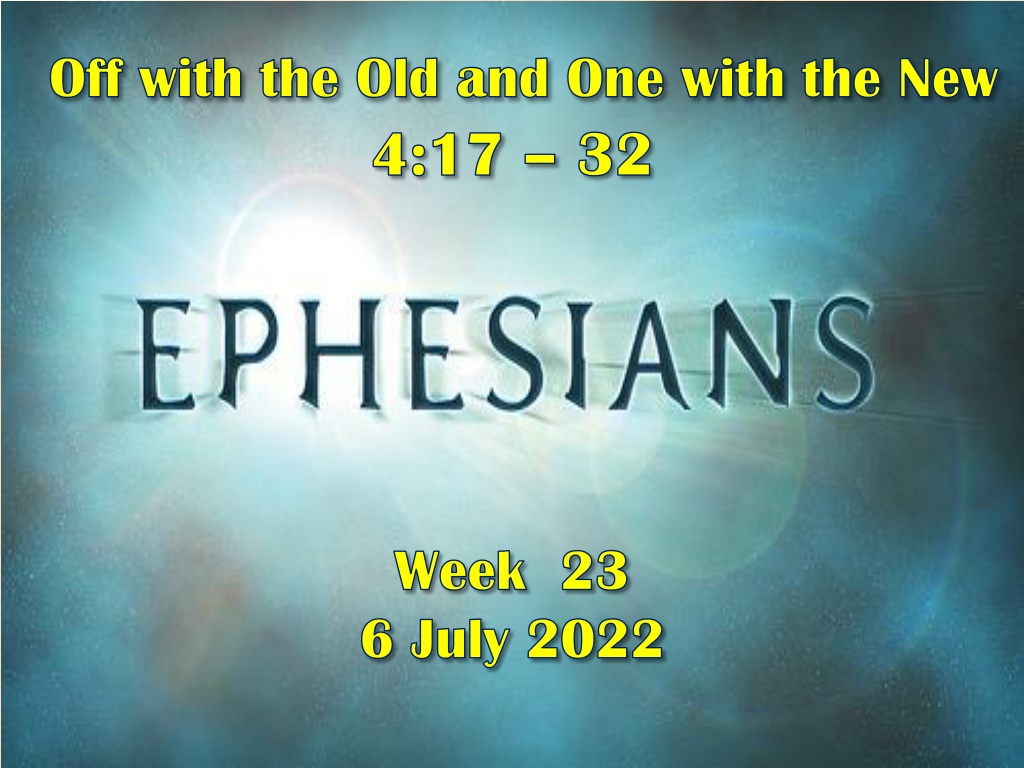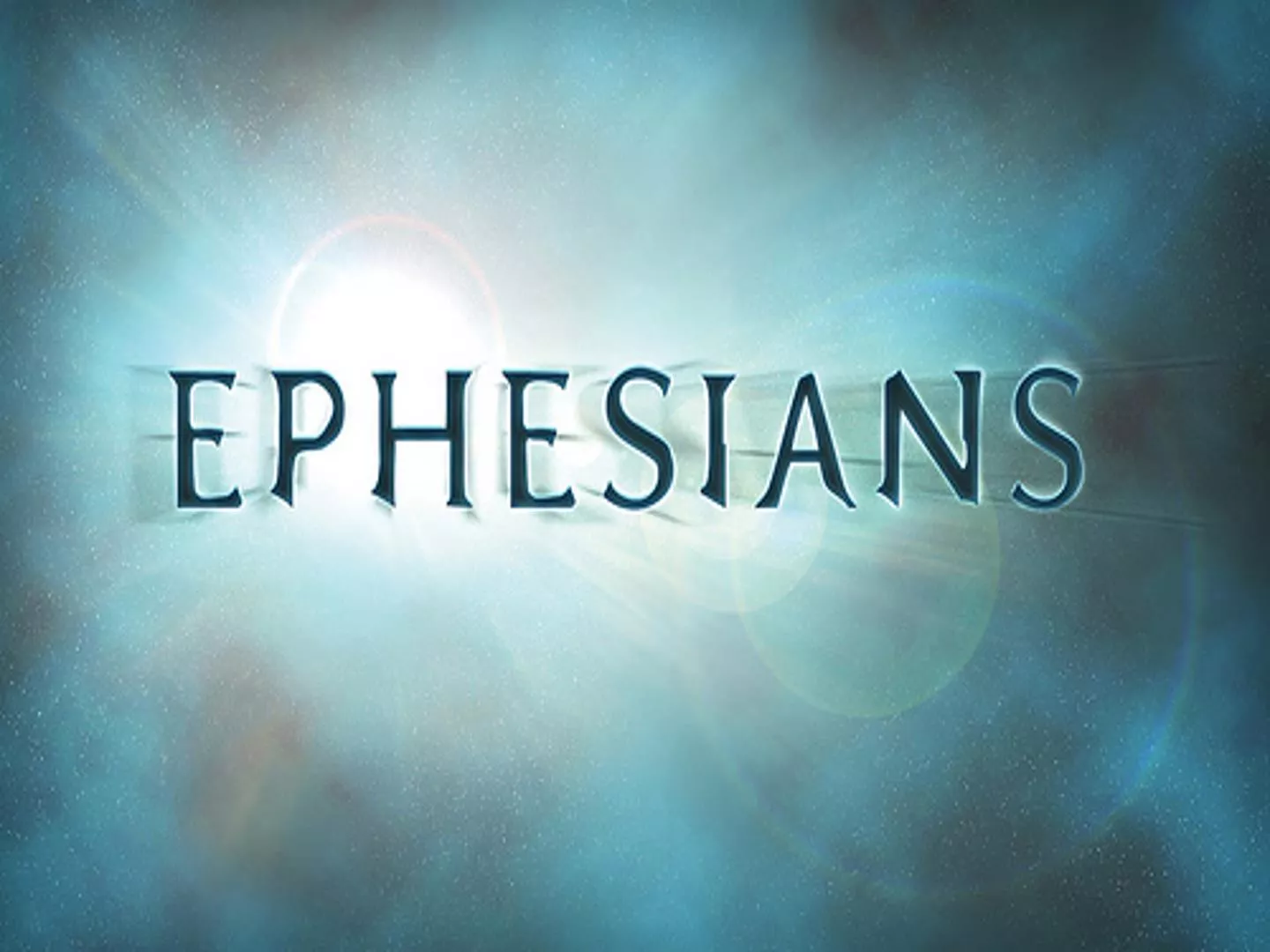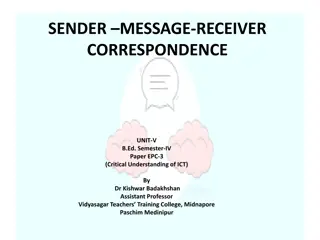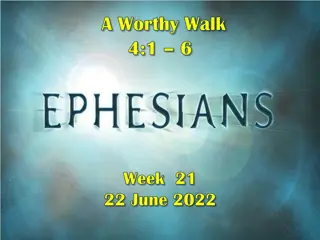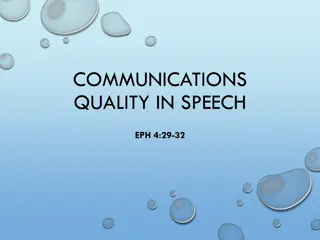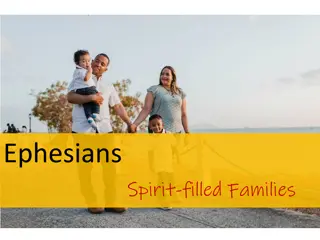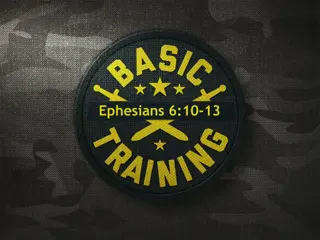Transforming Lives: The Message of Ephesians 4:17-19
Ephesians 4:17-19 discusses the contrast between the old and new ways of living, emphasizing the transformation believers undergo in Christ. Paul urges the Ephesians to abandon their former lifestyles of ignorance and impurity and embrace a renewed life of righteousness and holiness in the Spirit. The chapter highlights the importance of shedding old habits and embracing a new identity rooted in Christ's truth, grace, and forgiveness.
Download Presentation

Please find below an Image/Link to download the presentation.
The content on the website is provided AS IS for your information and personal use only. It may not be sold, licensed, or shared on other websites without obtaining consent from the author.If you encounter any issues during the download, it is possible that the publisher has removed the file from their server.
You are allowed to download the files provided on this website for personal or commercial use, subject to the condition that they are used lawfully. All files are the property of their respective owners.
The content on the website is provided AS IS for your information and personal use only. It may not be sold, licensed, or shared on other websites without obtaining consent from the author.
E N D
Presentation Transcript
Off with the Old and One with the New Off with the Old and One with the New 4:17 4:17 32 32 Week 23 Week 23 6 July 2022 6 July 2022
EPHESIANS CH4 OVERVIEW The last half of this chapter addresses the need to walk in purity. Contrasting how the Ephesians once walked as Gentiles in licentiousness and greediness, they are reminded of the truth which is in Jesus. This truth calls upon them to put offtheold man with its deceitful lusts, to be renewed in the spirit of their mind, and to put on the new man that is created in righteousness and holiness. Therefore they are called upon to put away lying, anger, theft, and all forms of evil speaking, lest they grieve the Holy Spirit by whom they were sealed for the day of redemption. Instead, they are to speak with truth and grace, work hard to help those in need, and be kind, tender-hearted, and forgiving just as God has forgiven them in Christ (17 32).
EPHESIANS 4:17 32 When it comes to how we dress, the occasion determines the wardrobe. If we want to ratchet up the level of formality, we might don sharp tuxedoes or elegant evening gowns. If we re headed to the office, a coat and tie or business casual outfit might do the trick. A day at the beach means flip-flops and swim gear. Let s face it the way you dress does impact how people perceive you. Of course, clothing doesn t change who you are inside; but who you are inside does affect your choice of clothing. The Christian life is no different. In Ephesians, Paul tells us that we must wear the right clothes to match the new life we have in Christ.
EPHESIANS 4:17 32 Before we can put on our new clothes, we first need to take off our old ones. Thankfully, in Ephesians 4:17-32, Paul tells us how to do both and gives us two contrasting pictures . . . The old, raggedy person we once were . . . and the new, radiant person we re meant to be. The believer s change of clothes is an important piece of the overall message of Ephesians: Because believers have new life through Christ, they ought to live a new life through the Spirit.
EPHESIANS 4:17 19 17So I tell you this, and insist on it in the Lord, that you must no longer live as the Gentiles do, in the futility of their thinking. 18They are darkened in their understanding and separated from the life of God because of the ignorance that is in them due to the hardening of their hearts. 19Having lost all sensitivity, they have given themselves over to sensuality so as to indulge in every kind of impurity, and they are full of greed.
EPHESIANS 4:17 19 Remember the tattered, soiled rags of sin you wore before you came to Christ? Maybe you were saved a little later in life, and those memories haven t faded as quickly as you had hoped. But chances are that all of us keep a set of old clothes in the closet so we can slip back into familiar, comfortable patterns of sin every now and then. That s why Paul told us to make a clean break with the past, to throw out all of our filthy rages for good. In 4:17, Paul return to the same thought with which he began chapter 4, his exhortation to walk in a manner worthy of the calling with which you have been called (4:1). Yet in 4:17 he expresses it by negating its opposite: that you walk no longer just as the Gentiles also walk.
EPHESIANS 4:17 19 This also alludes to Paul s description of the spiritually dead unbeliever mentioned in chapter 2: And you were dead in your trespasses and sins, in which you formerly walked according to the course of this world (2:12). The idea of walking like the Gentiles : refers to the old sinful lives the Ephesians lived before placing their trust in Christ (cf., 1Thes 4:5). Back then, their thoughts were futile foolish. They had no goal, purpose, or consideration for God. In order to help the Ephesians discard their grubby garments, Paul clearly defined what those articles of stained clothing really were: a dark mind (4:17-18), a hard heart (4:18-19), and a sin-filled life (4:19).
EPHESIANS 4:17 19 A DARK MIND The first piece of grubby garb that needs to be tossed out of the believer s wardrobe is the futility of mind, a darkened understanding, and the ignorance of God (4:17-18). This doesn t mean that an unsaved person lacks intelligence or reason, but that he or she has no spiritual perception. Unbelievers are simply incapable of accepting the things of God, which are spiritually appraised (1Cor 2:14). This begins to explain how a greatly intelligent, sophisticated, and well-educated person can be totally lost with regard to God, Christ, and spiritual things.
EPHESIANS 4:17 19 A HARD HEART The second article of mucky clothing is a hardness of heart and a callous condition (4:18-19), which Paul describes as the root cause of the futility, darkness, and ignorance of their minds. The word hardness indicates a s stony, petrified condition, like that of a once living, growing tree that has be petrified over the course of centuries. Applied to the heart in 4:18, it emphasizes the impenetrable nature of a person s cold, calloused heart. This hardness of heart means sheer rebelliousness, not emotional insensitivity. This leads to further darkening of understanding as God is displaced from the central position He should occupy. This in turn leads to the failure of the human conscience and the downward spiral in sin.
EPHESIANS 4:17 19 A SIN-FILLED LIFE A dark mind and hard heart aren t exactly ideal conditions for cultivating a garden of nourishing spiritual delights. Instead of the fruit of the Spirit, such conditions bring forth the weeds of sensuality, impurity, and greed (4:19). These terms picture a lifestyle that has sunk to a moral low. Having become utterly insensitive to right and wrong, the man or woman in this condition lives a wild life without decency, shame, or thought of repercussions. That vividly describes our contemporary Christless culture unhindered lust, unbridled promiscuity, and uncontrolled self-indulgence. Our culture is hell-bent in its cavalier, reckless pursuit of sin, and it makes psychopaths its martyrs and drag queens its models (Kent Hughes).
EPHESIANS 4:17 19 Though Paul s words refer primarily to unbelievers, the fact that he urges his readers to walk no longer, as the Gentiles do (4:17) indicates that even Christians can backslide into these conditions. Having returned to their old wardrobe of sin, they will find their minds shrouded in moral haze, their hearts increasingly hardened to the work of the Spirit, and their lives careening into a tangled jungle of immorality from which it is difficult to escape. Filth is filth, regardless of who wears the dirty garments.
EPHESIANS 4:20 24 20That, however, is not the way of life you learned 21when you heard about Christ and were taught in him in accordance with the truth that is in Jesus. 22You were taught, with regard to your former way of life, to put off your old self, which is being corrupted by its deceitful desires; 23to be made new in the attitude of your minds; 24and to put on the new self, created to be like God in true righteousness and holiness.
EPHESIANS 4:20 24 Paul uses this word order to place additional emphasis on the word you in 4:20. It s as if he were pointing his finger directly at his readers and calling them out of a vast crowd: You there! Those who have come to Know Jesus Christ have no business mucking it up with the Gentiles whose minds are darkened, whose hearts are hardened, and whose lives are spinning out of control. Having heard His voice, believers have been called out of their former lives of darkness into the resplendent light of Christ (4:21). Having received a Christ-focused teaching, believers have sanctified Christ as Lord in their hearts (1Pet 3:15). Receiving Jesus as the Truth (John 14:6), they are now able to walk in the truth, forsaking a wild life of sin (2John 1:4).
EPHESIANS 4:20 24 In light of this radical change, Paul urges his readers to utterly abandon any trappings of their former way of life. Paul exhorts them to remove their old, ragged, deteriorating clothes and throw them away (4:22) and by the renewal of their minds (4:23) to put on the new self, tailored after the pattern of Jesus Christ Himself (4:24). Just as God created Adam from the dust of the ground, He formed our new selves from the raw material of Christ s righteousness, holiness, and truth. Notice that Paul is focused on the renewed mind (4:23). That s the polar opposite of the mind mired in futility. How do we renew our minds? We immerse ourselves in Jesus Christ (4:20-21).
EPHESIANS 4:20 24 We learn more than mere information about Christ: we learn Him (4:20) His life, death, resurrection, and lordship. We continue to hear Christ as our Teacher, and we remain intimately associated with Him. This means leaving behind our value and choices that reject God and His ways. It means replacing them with a new worldview one that eagerly cooperates with God s will and Christ s way. Renewal goes deeper than changing outer habits; it s an inside work of the Spirit that works itself out in a new will and actions (Phil 2:12-13). It s like taking a shower every day that cleanses us and readies us to put on the Christ-like clothes of our new wardrobe.
EPHESIANS 4:25 32 25Therefore each of you must put off falsehood and speak truthfully to your neighbor, for we are all members of one body. 26 In your anger do not sin : Do not let the sun go down while you are still angry, 27and do not give the devil a foothold. 28Anyone who has been stealing must steal no longer, but must work, doing something useful with their own hands, that they may have something to share with those in need. 29Do not let any unwholesome talk come out of your mouths, but only what is helpful for building others up according to their needs, that it may benefit those who listen. 30And do not grieve the Holy Spirit of God, with whom you were sealed for the day of redemption. 31Get rid of all bitterness, rage and anger, brawling and slander, along with every form of malice. 32Be kind and compassionate to one another, forgiving each other, just as in Christ God forgave you.
EPHESIANS 4:25 32 In keeping with his setting aside [taking off] and taking up [putting on] image, Paul visits several realms of life, encouraging his readers to rid themselves of their filthy old habits and to replace them with new virtues. In these verses Paul presents several bad attitudes or actions that have to go . . . and the positive attitudes or actions that must replace them. In each case, Paul presents a reason for doing so either the basis for the change or a benefit reaped.
EPHESIANS 4:25 32 Let s start with a couple of observations about all of these negative and positive traits. First, they affect not only our relationship with God but also our relationships with others. Second, Paul balances negative commands with positive ones, explaining his reason for each command and demonstrating that our behavior should be connected to our beliefs. Finally, at the end of the list he clusters several vices and contrasts them with several virtues, implying that he could have continued his list of putting off and putting on for several pages. In other words, these specific examples are merely the beginning of an ongoing practice of replacing our old habits with new ones.
EPHESIANS 4:25 32 From falsehood to truthful speech (4:25). The word for falsehood includes all forms of lying, from out-and-out contradictions of known facts to careful couched nuances intended to deceive and mislead. It includes everything from white lies to unbelievable whoppers. Because the Ephesians had renounced the supreme falsehood of paganism, Paul urged them to take that decision even further by forsaking all lesser lies. Likewise, for us to grow as Christians, we also must uproot falsehood and cultivate truthfulness. Why does Paul exhort his readers to truthful speech? He does so because lying is a heinous sin against the body of Christ.
EPHESIANS 4:25 32 Lying undermines trust and results in conflicts and confusion. Jesus reminded us that Satan is the father of lies (John 8:44), but the Lord is the God of truth (Isa 65:16). As members of His body, eternally joined and related in love, truth is our new birthright and a mark of those who belong to God. Think of the different forms of lying that surround us every day. Consider whether any of them characterize your own life and need to be put off like a worn-out garment: deception diplomatic hedging exaggerating the facts half-truths plagiarism flattery hypocrisy habitual promise breaking . . .
EPHESIANS 4:25 32 We re immersed in a culture that feeds on deception and oozes with falsehood. That doesn t make our truth-telling mandate easy, does it? Some members of the media make their living stretching, shaping, spinning, and tweaking stories that might not have been quite as interesting without those little misleading or exaggerated tidbits inserted here and there to make you come back for more. Advertisements are know for lies. This is why there are consumer advocacy groups to do fact checks and government agencies to step in and say Enough is enough! And we are constantly bombarded by contradictory truth claims from cults and religious charlatans. In this tempest of falsehood, we Christians need to be teller of the truth . . . making it a part of your code of conduct.
EPHESIANS 4:25 32 From sinful rage to controlled indignation (4:26-27). Echoing Psalm 4:4, Paul allows for properly expressed anger in the life of a believer. What a relief! We would all be in deep trouble if Scripture excluded all forms of indignation. In fact, Christ Himself exhibited righteous anger at sin (Matt 21:12-13). When Paul commands, Be angry, he did not have in mind temper tantrums, uncontrolled fits of rage, or lingering bitterness. Rather, biblical, righteous indignation directs its anger at the appropriate object sinful behavior, moral corruption, and unjust circumstances. Frankly, we could use more of this kind of anger today. Too often we remain silent and apathetic while sin and injustice run roughshod over people.
EPHESIANS 4:25 32 Sinful anger, on the other hand, lingers. It holds a grudge. It seeks retaliation, revenge, and harm toward those who anger us. Paul is quite clear about this kind of expressive anger: Don t do it! In fact, to keep us from coddling our angry attitudes and actions, he sets a limit: Do not let the sun go down on your anger (4:26). In other words, don t brood over it. Don t go to bed mad and allow it to simmer overnight. Understandably, not all conflicts can be quickly resolved before bedtime. Sometimes it may take days or even weeks to work out full reconciliation. However, we can personally resolve not to let our anger fester into the next day.
EPHESIANS 4:25 32 The longer you let a broken relationship go without reconciliation, the easier it will be for Satan to drive a wedge into the relationship, creating division and disunity in the body of Christ (4:27). Paul puts this in even more explicit terms in Romans 12:17-19 [NKJV], where he writes > Repay no one evil for evil. Have regard for good things in the sight of all men. 18If it is possible, as much as depends on you, live peaceably with all men. 19Beloved, do not avenge yourselves, but rather give place to wrath; for it is written, Vengeance is Mine, I will repay, says the Lord.
EPHESIANS 4:25 32 From dishonest gain to honest labor (4:28). Stealing encompasses a whole array of activities, from obvious acts like shoplifting, embezzling, fraud, and robbing banks to the subtle borrowing of office supplies, wasting time at work, reneging on a debt, or failing to pay a fair wage. All of these are forms of dishonesty for the sake of personal gain some blatant, some subtle . . . all sinful. Instead of stealing, Paul directs us to work. Through the work of our hands we not only provide for ourselves and our families but also contribute to the good of others.
EPHESIANS 4:25 32 When we are able to provide for our own needs, we relieve the church or community from having to burden themselves with supporting us. This allows such resources to be used for those who are truly in need. At the same time, our own honest labor can produce an excess, giving us an opportunity to share from the abundance of our prosperity with those in need.
EPHESIANS 4:25 32 From unwholesome speech to edifying speech (4:29). In the Greek, the word for unwholesome was used to describe rotten fruit or putrid fish. In other words, the kind of stinking things that would make you say, Yuck! In our text, it means cursing, vulgar phrases, crude jokes, and even sarcastic, unkind, or mean-spirited remarks. Plenty of the material shared online nowadays also falls into this category. To give a better idea of the broad scope of unwholesome speech, Paul contrasts it with its opposite: words that are good for edification and appropriate to the situation, which impart grace to those who hear (4:29).
EPHESIANS 4:25 32 The emphasis should not be on entertaining others but on edifying them. We should avoid tearing people down and focus on building them up. We all have heard: If you can t say something nice, don t say nothing at all. Not bad advice. If we could only learn to live by this simple rule, we d save our families, friends, and churches from a world of pain.
EPHESIANS 4:25 32 From hateful attitudes and actions to loving ones (4:30- 32). Paul next inserts a thought that could be inserted after any of his five examples: Do not grieve the Holy Spirit of God, by whom you were sealed for the day of redemption (4:30). Paul has already mentioned the work of the Holy Spirit in sealing us at the moment of salvation (1:13). Yet his statement in 4:30 gives us insight into the fact that though the sealing is permanent, our sin can cause the Holy Spirit pain and distress. The word grieve is the same word used to describe Jesus agonizing distress in the garden of Gethsemane on the night of His betrayal (Matt 26:37). When we lie, lash out in anger, steal, refuse to forgive, or insult or curse another, we literally cause the Spirit sorrow.
Ephesians 4:30 Ephesians 4:30
EPHESIANS 4:25 32 But when we walk in freedom, loving as Christ loved, caring as Christ cared, forgiving as Christ forgave, we delight the Spirit. What powerful motivation for putting off the old and putting on the new! With this reminder of the presence of the Holy Spirit, Paul lists sixvises that reflect the attitudes and actions of an unkind, unforgiving, and hateful heart (4:31): bitterness harbors resentment; rejects reconciliation. rage deep-seated rage that fails to subside. anger uncontrollable temper with explosive outbursts. brawling loud outcries; disrupt peace, cause confusion. slander destroying the reputation of others thru gossip. malice harming others by intentional acts of wickedness.
EPHESIANS 4:25 32 Consistent with his theme of off with the old, on with the new, Paul exhorts the Ephesians to replace these six hateful vices with three loving virtues (4:32): kindness acting graciously and mercifully toward other, just as God has with us (2:4-5). compassionate (tender-heartedness) offering care and comfort to those in need, just as the Holy Spirit has come alongside us as our Helper (John 14:16). forgiveness extending reconciliation to those who have offended or harmed us, just as Christ has forgiven us (1:7).
EPHESIANS 4:25 32 Paul exhorts the Ephesians and us to rid our closets of the stained, tattered, and filthy garments of our past and to replace them with the clean, fresh wardrobe custom- tailored by the Spirit. When we do, we reflect the holiness of God, follow the example of Christ, and avoid grieving the Holy Spirit of promise. Of course, every one of us will inevitably fail on occasion, slipping into our old habits, reviving old vices, and repeating past sins. Yet, 1John 1:9 provides an immediate means of restoring our righteous garments when we ve stained them with sin > If we confess our sins, He is faithful and just to forgive us our sins and to cleanse us from all unrighteousness. Swindoll calls this verse The Christian bar of soap.
EPHESIANS 4:25 32 When your new clothing gets a smudge, stain, or tear, don t ignore it! Turn to Christ quickly; deal immediately and openly with your sin. Confess it all of it and experience His merciful restoration. Continually lay your life before Him as a living sacrifice (Rom 12:1-2), and learn to walk tall and clean, clothed in the splendid righteousness provided to us free of charge. Make it your aim to exemplify the truth that those who have new life through Christ should live a new life through the Spirit.
NEXT CLASS 13July 2022 Before next class, read the below verses in the Before next class, read the below verses in the NIV and in one other versions of the Bible, i.e., NIV and in one other versions of the Bible, i.e., NKJV, NRSV, KJV, CEV, etc NKJV, NRSV, KJV, CEV, etc Chapter 5:1 14 From Walking in Darkness To Living in Light
